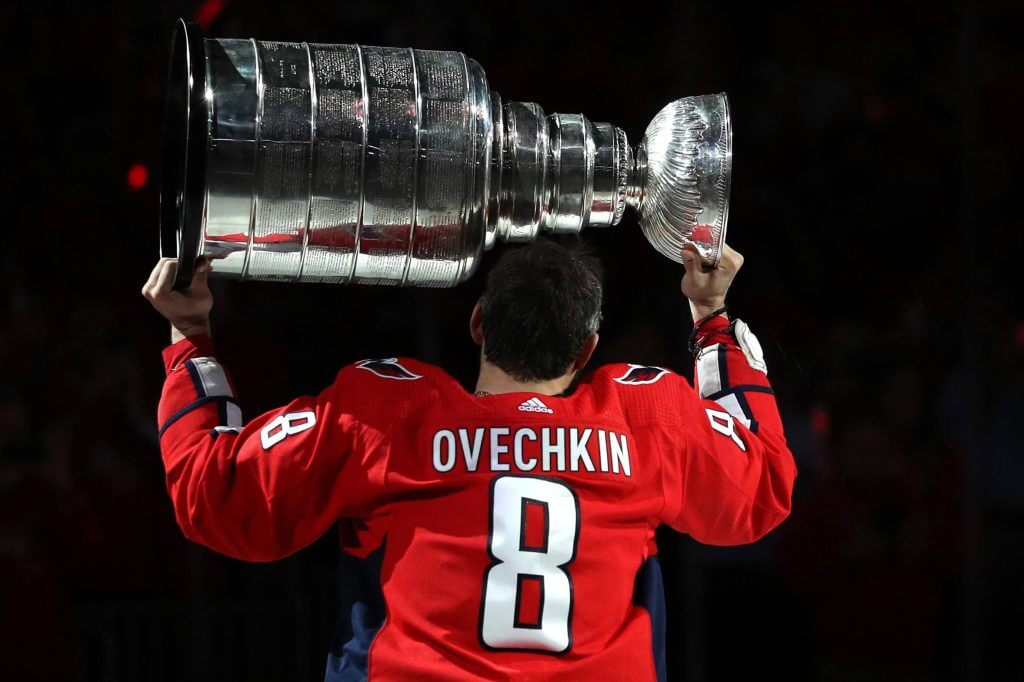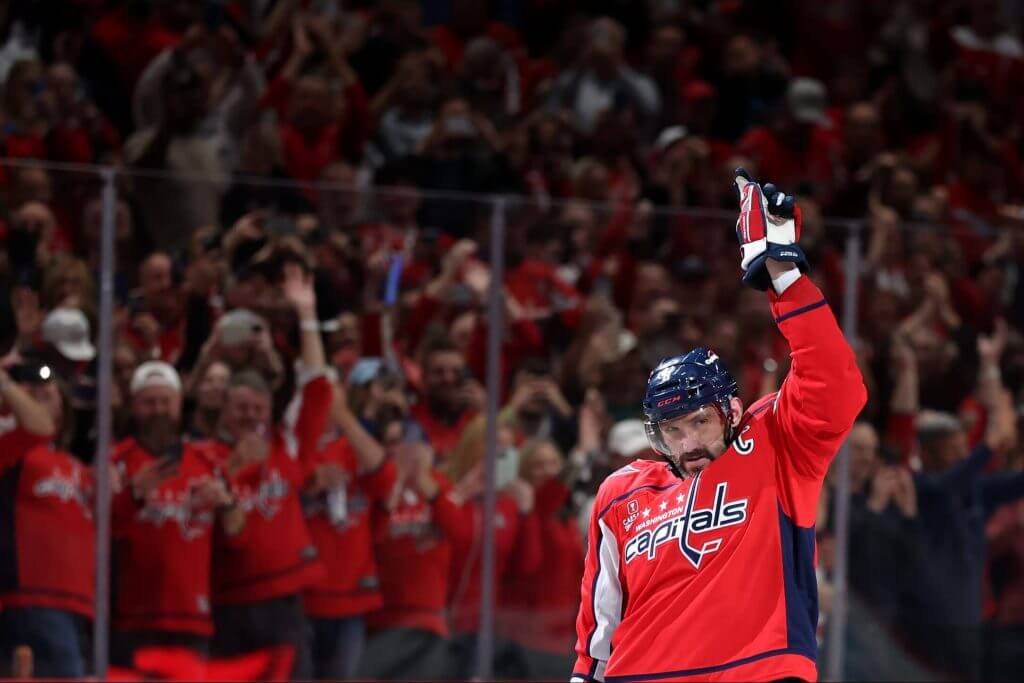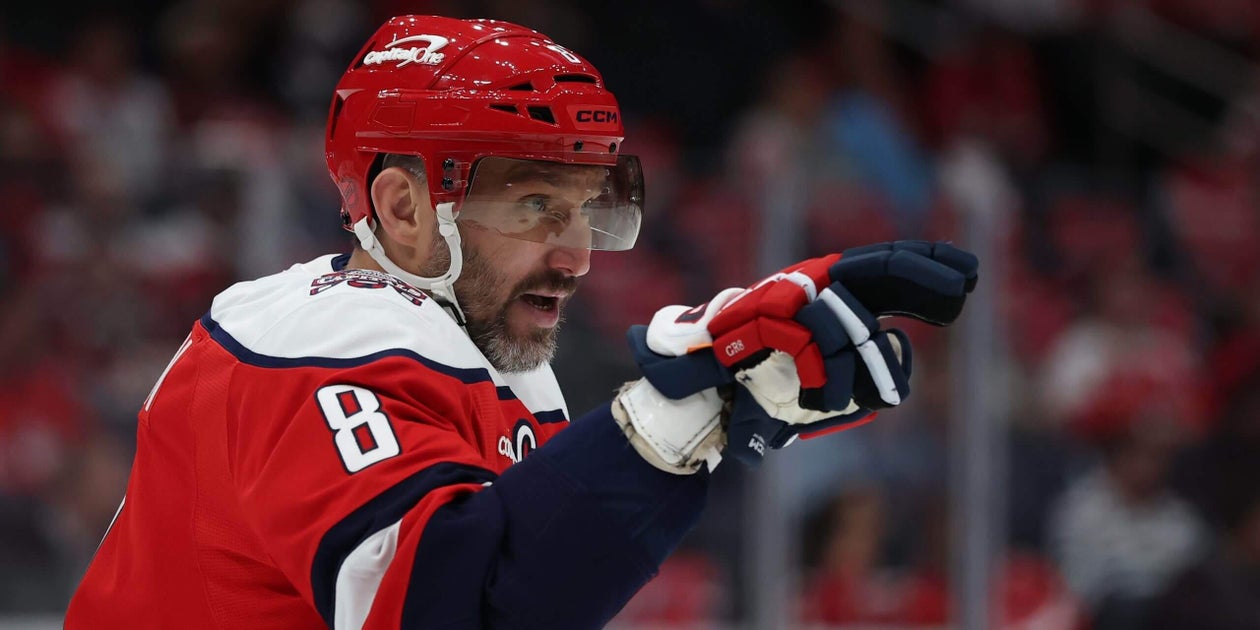ARLINGTON, Va. — Near center ice at the Washington Capitals’ practice rink, Alex Ovechkin stretched his hips. He chatted with his coach. He goofed around with some of his teammates and he gave pointers to others. Along the way, he flipped a puck to a poster board-toting 15-year-old who was angling for a birthday gift.
And then, after 15 minutes or so, he left. Morning skate complete.
There’s no way to say, with any degree of exactitude, how many times a scene like that has played out during Ovechkin’s career. Travel often forces NHL teams to cancel their pre-game shake-outs, and Washington’s, at various points over the last 20 years, have been optional. It’s an option that Ovechkin — before he went gray, before he became a father, before he scored more goals than other player in NHL history — has no problem exercising.
Perhaps there have been 1,000. Maybe more, maybe less. Regardless, it’s not an important number in a career that, increasingly, is laced with big, round ones. Ovechkin passed Wayne Gretzky four goals ago. With one more, he’ll become the first to hit 900.
The number on his mind, though, is 1,500. When he takes the ice on Saturday against the Ottawa Senators, he’ll have played that many games with the Capitals. Only 23 other players NHL players have reached that game total, and only seven others — legends, each one — have hit that mark with a single franchise.
Most NHL games with one franchise
PLAYERFRANCHISEGAMES
Gordie Howe
Detroit
1,687
Patrick Marleau
San Jose
1,607
Nicklas Lidstrom
Detroit
1,564
Alex Delvecchio
Detroit
1,550
Shane Doan
Winnipeg/Arizona
1,540
Ray Bourque
Boston
1,518
Steve Yzerman
Detroit
1,514
Alex Ovechkin
Washington
1,499
Some of those players have sent in video messages to congratulate Ovechkin on joining the club, with Shane Doan calling him “the greatest of the greats.” This milestone, Ovechkin said, means something to him in a way that not all of the others have.
“Just to be part of one organization (and) play so many games with one team, that’s what I think every athlete wants to do,” Ovechkin told The Athletic on Tuesday, a few hours before playing in Game No. 1,498 against the Seattle Kraken. “No one wants to change teams. But it’s a business and I’m lucky enough to be able to stay in one organization for so many years.”
That good fortune is tangible in many ways. There are banners at MedStar Capitals IcePlex, renovation plans at Capital One Arena and youth programs throughout the region. There’s also skill involved, though, and intentionality. Approximately 8,000 people have played in the NHL, and 7,993 have spent less time with their original teams than Ovechkin. None of it was an accident, and none of it was a guarantee.
Capitals president of hockey operations Brian MacLellan, one of the few members of the organization who has been in place longer than Ovechkin, doesn’t hide from that fact.
Asked directly whether there were points over the last 20 years when moments like this one seemed tenuous, MacLellan brought up the aftermath of the 2017 Stanley Cup playoffs. The Capitals, for the second straight year, saw their road end in the second round against the Pittsburgh Penguins — but this time, it felt different. It felt worse.
In 2016, MacLellan said, the series was a coin flip between the two best teams in the league. Washington, with 120 points, had won the Metropolitan Division and the Presidents’ Trophy, while Pittsburgh, after installing Mike Sullivan as head coach in December, had played to a 109-point pace. Ovechkin, at 30, was coming off a 50-goal regular season and the sixth Rocket Richard Trophy of his career.
The series ended in six games, but it was close. Washington took Game 1, the first of three — including Pittsburgh’s clincher — that went to overtime.
“You could argue and say, ‘You know what, they played better. They deserve it,’” MacLellan, who was then Washington’s general manager, said.
A year later, the result was the same, but the process was not. The Penguins were playing without star defenseman Kris Letang, for one, and the Capitals were coming off yet another Presidents’ Trophy. Pittsburgh blew a 3-1 series lead but won Game 7 2-0 in Washington, thanks in part to 29 saves by Marc-Andre Fleury. One of the biggest came on Ovechkin, with a partially open net in the second period.
“We tried,” Ovechkin said after the game. “We tried our best.” He scored twice in the series, giving him 46 in 97 career playoff games, but nobody was counting.
“We had the better team and we lost,” MacLellan said more than eight years later. “And that one crushed everybody. … Organizationally, exit meetings — we had a lot to get through after that loss.”
Top-six forward T.J. Oshie was a pending UFA, star defenseman John Carlson was eligible for an extension and Ovechkin had four seasons remaining on the 13-year deal he’d signed back in 2008, but uncertainty ruled the day.
“‘I’m not sure this is going to stay together, because guys are mad,’” MacLellan said to himself after exit meetings were complete. “‘They’re angry. We’ve got to give them some time. Do we need to make changes?’ So we went through the whole deal. Each player individually, the organization, the team, everything … There was a lot of pressure. ‘We need to make changes. We need to make changes.’”
The core — Ovechkin, Carlson, Nicklas Backstrom, Oshie, Evgeny Kuznetsov, Tom Wilson — stayed in place over the summer, but MacLellan wasn’t sold. A 5-6-2 start to the following season didn’t help.
“At the beginning of that year,” MacLellan said, “I was like, ‘I don’t know if we’re gonna make it. Something’s going to have to happen.’
“We still had energy from that loss that we needed to get through. And that’s the year we won it.”
The 2018 Stanley Cup Final, against the expansion Vegas Golden Knights, was actually the Capitals’ easiest. They dug themselves out of a 2-0 hole in Round 1 against Columbus, slayed the dragon in Round 2 with a six-game win over Pittsburgh and needed to win a road Game 7 against Tampa Bay. Two weeks later, with Fleury watching for good measure, Ovechkin took his Cup lap at T-Mobile Arena.
At the time, he’d played 1,003 regular-season games. That moment, MacLellan said, set up the ensuing 497.
“It’s amazing, isn’t it?” MacLellan said. “We’ve worked through a lot as an organization. He’s gotten through stuff — a lot of pressure on him when we went through all that stuff, because he’s our guy.”

Alex Ovechkin celebrates with the Stanley Cup in 2018. (Patrick Smith / Getty Images)
For 12 years and counting, Wilson has had a front-row seat to the Ovechkin experience. Post-Cup, he said, the approach changed. Part of it was personal — that August, Ovechkin’s wife, Nastya, gave birth to their first son, Sergei. Part of it was professional; one mountain had been summited, and the next climb wasn’t much of a thought.
When the Capitals won the Cup, Ovechkin was 32 years, with 606 regular-season goals, 288 from tying Gretzky. The math was getting simpler, but it was still unkind; a 40-goal pace would get him there in seven-plus seasons.
“I think he became so at peace with where he was, for like three or four years,” Wilson said.
Ovechkin scored No. 700 on Feb. 20, 2020, and finished that season with 706. His next regular-season goal, due to the COVID-19 pandemic, didn’t come until Jan. 21, 2021. On Dec. 13, 2022, he hit 800.
Along the way, Ovechkin and MacLellan had another set of important conversations. Players such as Backstrom, Oshie and Kuznetsov were phasing out as a high-end contributors. MacLellan’s job, along with that of current GM Chris Patrick, was to build a team that was competitive enough to win games — and competitive enough to help Ovechkin hit No. 895.
“He always wants to win,” MacLellan said. “He doesn’t have fun if we’re not playing well. And so it’s always, ‘How can we be more competitive? How can we add?’ It’s never, ‘We’re going to take a step back.’ It’s never been that way.”
“In his mind, it’s, ‘I’m not here for that. We’re not going backwards. We’re going to keep winning and trying to win and move forward.’ So that’s been the philosophy between us. And we’ve communicated that to each other — and maybe there’s disagreements along the way, but we’ve always worked it out.
By the end of the 2023-24 season, after a surprise run to the postseason, he was at 853 goals.
It was then, Wilson said, that he saw another shift. At Ovechkin’s 39th birthday party, there was less peace. Gretzky was within spitting distance, and Ovechkin knew it.
“You could tell,” Wilson said. “He was talking about that pressure. And of course he was. He’s only human, right? And then he just knocks it down.”
“The first couple of big milestones, it’s like, ‘Oh, is he gonna get there? Is he going to get 700 goals? Aw no, he’s running out of steam.’ Then he knocks it down. 800 goals, knocks it down. And then it was like ‘There’s no way he’s going to pass Gretzky this year.’ Then he breaks his leg, scores 44 goals and passes Gretzky like nothing.”

Alex Ovechkin celebrates tying Wayne Gretzky’s goal record in April. (Patrick Smith / Getty Images)
The injury cost him just 16 games. Wilson and MacLellan both said that set of specifics — that Ovechkin broke his leg, that he returned from it so quickly and that he still finished the job with time to spare on the 2024-25 schedule — isn’t mentioned frequently enough.
“The broken leg thing was devastating, because I know he had put a lot into (saying), ‘This is the year,’” MacLellan said. “And then we’re sitting there going, ‘Man, he’s going to have wait another year. Can he do it? Is he going to be healthy?’”
An early clue, MacLellan said, was that Ovechkin boarded the flight from Utah back to Washington after the injury without crutches.
“His ability to handle things mentally is incredible. Even with the leg thing, he’s out on the ice way too early, but he’s just proving a point. It’s like, ‘You know, the bone has a minimum amount of time …’ And he wants to get some skates on and move around a little bit. The trainer is freaking out. ‘Like, seriously?’
Two weeks after the injury, he was on the ice. Forty days later, he was back in the lineup. Wilson was impressed, but not surprised.
“To me, as an athlete, to be able to step up in those situations where people are doubting you and there’s adversity, and you just knock it down — the mental strength and physical strength to be able to do that is insane,” he said.
For years, Wilson has been asked the same questions, either by reporters or friends back in Ontario. They’re variations on a theme. “What’s Alex Ovechkin like?” “Man, isn’t Alex Ovechkin good?” “Can you please find new, interesting ways to discuss just how good Alex Ovechkin seems to be?”
Wilson, without fail, obliges — and he’s happy to do it. “It’s almost impossible to put it into words,” he said. “Everybody that comes through this locker room is fortunate enough to be able to take it in and see it firsthand. To have a seat shotgun with him, it’ll be one of the biggest honors of my career.”
How long Wilson will stay in that seat remains a question. Ovechkin turned 40 in September — there was no Gretzky chase to darken that party. His contract is up at the end of this season, and he’s given no real indication of his plans, largely because he hasn’t yet made up his mind.
“You never know what’s going to happen tomorrow,” he said, “so you stop thinking about next year.”
Wilson believes him: “If he knew it was his last year, he would’ve said it. That’s my thought.”
Whatever the choice is, MacLellan said, it’s Ovechkin’s to make.
“We want to give him room as an organization to do what he wants to do. And we’re going to be supportive of it,” he said. “What he’s done, the amount of respect we can give him, we’re gonna give it to him.”
In the meantime, MacLellan and Patrick’s retool has worked. Washington’s roster is dotted with trade acquisitions, free-agency additions, homegrown prospects and resurgent holdovers, and they’re on track to be a championship contender for a second consecutive season. Spencer Carbery’s job, as head coach, is to make it all hang together — with a 40-year-old legend still at the top of the food chain.
“Just learning how to manage his minutes and the power play and all that different stuff — I could write a book on it, man. I’ve got a three-series novel all ready to go,” Carbery said.
The series would sell. In their first two seasons together, despite Ovechkin’s age and a certain amount of inevitable decline that came with it, he scored at a 43-goal pace. One trick Carbery picked up: when Ovechkin’s play away from the puck dips, he might not get to jump over the boards for the next offensive-zone start.
“He’ll look up to me,” Carbery said, “and I’ll send another line. And he knows that’s a subtle message of like, ‘Hey, you’ve got to earn these o-zone starts. You’ve got to hold up your end of the bargain. There’s no (verbal) communication. He just knows.”
“That’s my way of saying, ‘Hey, we still need you to earn the opportunity to get in the offensive zone. Yeah, I’m gonna put (him) out there as much as I can because I know that (his) unique skill set gives us the best opportunity to win this game and to score a goal. But also he needs to know that he’s got to do the necessary things with and without the puck.”
Those exchanges, Carbery said, are one of the joys of the gig.
“For me as a coach, those are the most impactful moments, when it comes to showing him direction and being really, really clear with the messaging — and getting his opinion on what he sees, and building that trust to where I can bring him sometimes difficult messages. .. And he accepts it and takes it, because he knows I’ve got his back. And he knows that trust has been built from when I first got there.
“There’s been a few moments that I’ve had with him personally as a coach and walked away from the interactions and gone, ‘Wow. That was Alex Ovechkin.’”
That’s been true for 1,500 games, and it’ll be true for a few more.

